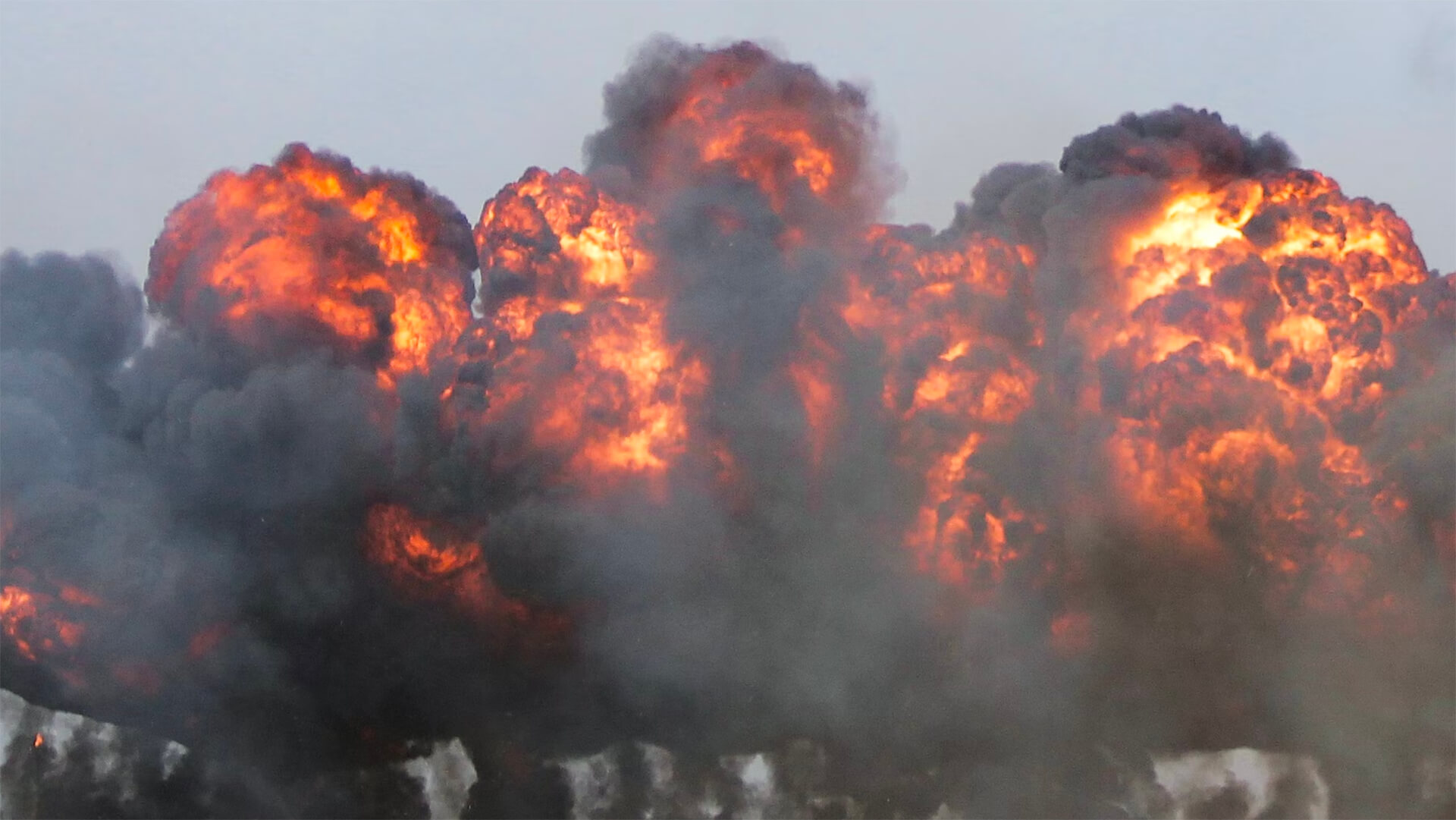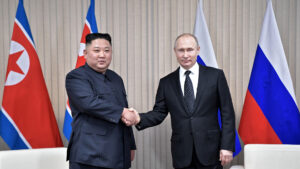Picture one of those old westerns where the outlaw and sheriff are about to have a standoff outside the saloon. The bad guy (who has never lost a duel) sweeps back his coat and reveals his shiny-six-shooter. The sheriff (who isn’t a great shot) then sweeps back his coat and brandishes a nuke…perhaps not the most realistic scenario, but it helps me get my point across. If your country can’t win a traditional fight, throw a couple nukes into the mix and hopefully no one is dumb enough to poke that bear.
With the South Koreans “keeping nukes on the table,” the conversation has now turned into what other countries should build out nuclear options. There are two boxes a country should be able to check before going nuclear: do they have the technical capacity to do so and is there a strong enough strategic reason to have them?
Just as the sheriff in our scenario knew he couldn’t win in a traditional gunfight, there is a long list of countries that would fall very quickly in a conventional war. Throw nukes into the mix and everything changes. Unfortunately, that list of countries is longer than any of us should be comfortable with.
Prefer to read the transcript of the video? Click here
Here at Zeihan On Geopolitics we select a single charity to sponsor. We have two criteria:
First, we look across the world and use our skill sets to identify where the needs are most acute. Second, we look for an institution with preexisting networks for both materials gathering and aid distribution. That way we know every cent of our donation is not simply going directly to where help is needed most, but our donations serve as a force multiplier for a system already in existence. Then we give what we can.
Today, our chosen charity is a group called Medshare, which provides emergency medical services to communities in need, with a very heavy emphasis on locations facing acute crises. Medshare operates right in the thick of it. Until future notice, every cent we earn from every book we sell in every format through every retailer is going to Medshare’s Ukraine fund.
And then there’s you.
Our newsletters and videologues are not only free, they will always be free. We also will never share your contact information with anyone. All we ask is that if you find one of our releases in any way useful, that you make a donation to Medshare. Over one third of Ukraine’s pre-war population has either been forced from their homes, kidnapped and shipped to Russia, or is trying to survive in occupied lands. This is our way to help who we can. Please, join us.
CLICK HERE TO SUPPORT MEDSHARE’S UKRAINE FUND
CLICK HERE TO SUPPORT MEDSHARE’S EFFORTS GLOBALLY
TRANSCIPT
Hey Everybody. Peter Zeihan coming to you from an exciting hotel room back on January 12th. So Wednesday of the last week might be two weeks. By the time you finally see this, who knows? The *South Korean* president said that they were keeping nuclear weapons as a possibility on the table for future strategic development. Now, this is a big no no in international affairs, just kind of publicly flirting with the idea, like, yeah, we might go nuclear, especially if that word Korea is involved.
But you have to look at it from their point of view. The United States has changed the way its military works. Back during the Cold War, when there really wasn’t any other naval power out there, the United States maintained a relatively large destroyer fleet. And in doing so, we were able to patrol the global oceans for everyone. With the Cold War ending in 89 and the Soviet system collapsing in 1992.
The world went different ways and we saw a number of secondary powers start to rise, you know, your Chinese, your Brazils, your Indias and so on. And the United States kind of declared that history was over. And it thought that the only strategic policy that we would need is to have a hammer to take out any country that might challenge what the post World War Two post-Cold War order might be.
So, you know, your odd Yugoslavia is or maybe your North Koreas. And in that sort of scenario, we changed the way our military worked. So we started having fewer destroyers and more aircraft carrier battle groups. So it was less about preserving the peace that we now thought had been achieved and instead about making sure we had the military capacity to challenge anyone who would try to stick a knife in the eye of the system.
At the same time, all these secondary powers started to have their own security policies independent of Cold War norms, and a number of countries started to build their navies, with China being at the very top of that list. So even if the United States could stomach the political cost of being involved in the world and being the global policeman, I would argue that the United States is no longer in a position where the balance of forces allow it to create an environment that’s safe for global commerce, U.S. naval power, stronger than it’s ever been, but it’s also more concentrated than it’s ever been. And ultimately, if you want the tens of thousands of tankers and container ships and Bulker ships that ply the oceans every day to be able to pick up and drop off cargo wherever they need to. The 80 destroyers that the United States has now, just don’t cut it. They probably wouldn’t have even cut it during the Cold War.
And so instead, countries are starting to look at their own security environment and making decisions about whether they need to take independent action because they don’t find that the United States security guarantees are worth what they used to be. And that’s before you consider that they probably aren’t worth what they used to be because the United States is moving on.
So South Korea is a country that clearly has a security need. It’s sandwiched between North Korea, Japan and China, all countries that it considers rivals to a certain degree. And it is the weakest military power of the four. Having nukes would be the great equalizer. And the Koreans have had nuclear civilian power for decades. They’re certainly technologically competent. And I have no doubt that it would only take a few days, to weeks for the South Koreans to build a crude nuclear device if they wanted to, and a deliverable weapons system in under a year. Well, within their capacity. And this is hardly a conversation that should be limited to South Korea if you’re going to consider the cost economically, strategically, diplomatically of going nuclear, you have to have two things. Number one, the technical capacity to build it out yourself. And number two, a strong strategic, overriding reason to take the risk in the first place. Korea checks both columns very, very firmly, but so does Japan, and so especially does Taiwan. And there’s no surprise here. This is shaped of strategic realities for the Chinese when it comes to Taiwan.
The unofficial battle plan for the Chinese, if they ever do decide they want to pull the trigger on Taiwan, is not to do a slow build up over weeks like the Russians did when they were getting ready to attack Ukraine last February. No, the Taiwanese would see that and they would use that time to build a few deliverable nuclear systems. And so the only way that Taiwan could theoretically fall is if it came at the loss of several Chinese cities. So the unofficial plan in Beijing is to basically text all their soldiers, tell them to run to the closest port, hijack a fishing vessel and just set sail. You know, you’ll have a million casualties simply crossing the Taiwan Strait. But at least you don’t lose a city that way.
Outside of East Asia, there’s plenty of other powers who kind of fall into these same two categories. If you’re looking at anyone on the Russian periphery. Obviously, Ukraine wishes they had nukes at the moment. But if the West proves to be insufficiently united in dealing with it, whatever comes next in the Ukraine war, I can absolutely see in an environment where Finland and Sweden and Poland all go nuclear.
They all have the technology. They certainly all have the need. You could even toss Romania into that group. But the big one, the one that will really change everyone’s strategic calculus is Germany, because any post Ukraine world where the Russians look strong is one where the Germans know that in the end they’re going to be fighting the Russians on the plains of Poland.
And since the Germans have spent the last 60 years disarming, they absolutely do not have the military industrial plant in a short period of time in order to face down the Russians in number. The only way that they can buy time is by going nuclear. One final country to kind of toss into this mix, and that’s Saudi Arabia.
It’s not that the Saudis have the technical capacity to go nuclear. I mean, what are they going to do, rub two molecules of oil together to get fission? No, but they do have really deep pockets and I can totally see them walking into Islamabad, Pakistan, and writing a check and walking out with a few nuclear weapons. We are nearing a point again, with the United States no longer being involved in the region, we’ve withdrawn from the Middle East pretty much completely.
We’re nearing a point where the Saudis and the Iranians are going to be having a direct confrontation in the not too distant future. And when that happens, the Saudis can either take their fat, lazy population with absolutely no military skills and line them up in the desert and hope that is enough. Or they can use their Air Force, which is okay, and hope that bombing the advancing Iranian forces is enough or they can brandish a nuke.
So bottom line, the countries that are most likely to go nuclear in the next several years are not the normal candidates. But the rationale stays the same. You go for nukes if you don’t think you can win a conventional conflict. And the list of countries who can’t win a conventional conflict but have the capacity of going nuclear is a lot longer than everyone should honestly be comfortable with.
Alright. That’s it for me. Until next time.








